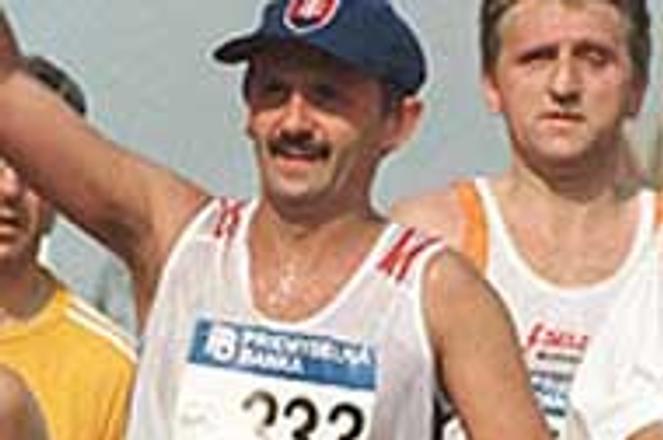Unlike Košice marathon winner Róbert Štefko, Prime Minister Mikuláš Dzurinda was delighted with his finishing time: 3:38:28.photo: TASR
KOŠICE: Róbert Štefko, the winner of the 69th International Peace Marathon in Košice on October 3, sat on the hot asphalt behind the finish line breathing deeply and cursing softly. Although having moments ago won Slovakia's most famous - and Europe's oldest - marathon in a time of 2 hours, 14 minutes and 10 seconds, Štefko was bitterly disappointed at not having set a course record. Korean Go-Tchun-son had run 2:13:34 in 1978, and Štefko, a sub-2:10 marathoner, had been confident of a better time.
Born in Košice in 1968, Štefko often passed the city's marathon statue on his way to school. The pedestal of the statue bears the names of many Slovak winners of the 42.2 kilometre run - from Karol Halla, who won the event in 1924, the first year it was held, to František Višnický and Peter Pipa. "I decided I wanted to see my name on it as well," said Štefko.
With his main aim of victory fulfilled, Štefko recovered his equanimity soon after the race. "It's a shame I didn't beat the record, but the weather conditions were better for African runners, not for me," he said. "I like the cold - in London I ran 2:09:53, and I fought a stronger wind than in Košice, but there it was 10 degrees Celsius, while in Košice it was 24 degrees. Too hot."
Štefko is by far Slovakia's best long distance runner, having run Košice in 1990 as a 'rabbit' - a pace-setter - and again in 1992, when he finished fifth. His marathon career took off when he placed seventh in the famous November New York Marathon, and then sixth in London, in a world-class time. He finished twelfth in New York the following year, and is currently training for the 2000 Olympics Marathon in Sydney, Australia.
Košice's Peace Marathon organisers did their utmost to help Štefko to beat the 20-year-old course record. Rabbits Ezayedi from Libya and Nowak from Poland were brought in to give Štefko a target, but faded after the 25th kilometre.
The departure of the pace-setters left Štefko alone with the competition - Ligneel from Belgium, and the Moroccan Echchadli - and severe stomach cramps. "If the other two had known I was almost dead they would have run faster," Štefko joked after the race. "I drank less at the 35th kilometre refreshment station, and then nothing at 40 km, and maybe that was the reason my muscles went heavy and hard."
Štefko still had a chance to beat the course record as he passed the 37 km mark, but he was unable to maintain the necessary 3:15-3.20 minute pace per kilometre. "It doesn't matter, at least I ran in the kind of conditions I can expect at the Olympic Games in Sydney 2000," he said. "I'm sure I won't be alone on the road there."
But as his thoughts turned to Sydney, Štefko's doubts seemed to return. "I can imagine the African runners will be pushing the tempo for a fast time," he said. "Sometimes I feel it is impossible and useless to run with the Africans. They were born to run. I can compete with them probably only when it's freezing outside."


